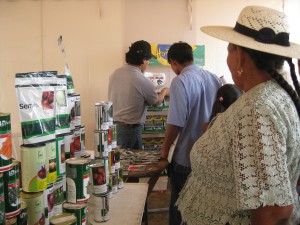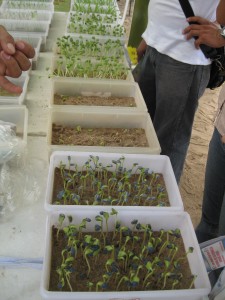 Through a NSF-funded post-doctoral fellowship (2007-2009), I began examining the conditions under which agrarian policy reforms are introduced and how they are contested in the Bolivian lowlands, a region that resource economists have called a “natural resource hotspot.” From conflicts over who pays how much for the fanega of rice to who benefits from government-sponsored programs, my research explores how the Agrarian Revolution of the twenty-first century is unfolding in the Bolivian lowlands.
Through a NSF-funded post-doctoral fellowship (2007-2009), I began examining the conditions under which agrarian policy reforms are introduced and how they are contested in the Bolivian lowlands, a region that resource economists have called a “natural resource hotspot.” From conflicts over who pays how much for the fanega of rice to who benefits from government-sponsored programs, my research explores how the Agrarian Revolution of the twenty-first century is unfolding in the Bolivian lowlands.
I combine the political economy of the agrarian question and processes of subject formation to bear on the study of agrarian conflict in the department of Santa Cruz. I focus on how resource users behave in relation to the changes in politics, institutions, and social relations associated with land reform. A large part of this work examines the positioning of agrarian elites in the conflict over land and access to resources. This work has led to publications on the intersection of the coca economy and current agrarian politics in the Bolivian lowlands (Geojournal), an analysis of agrarian capitalist views in Santa Cruz (Journal of Peasant Studies), and the relationship between hegemony and capitalist agriculture in the lowlands (Latin American Perspectives).
More recently, I am collaborating with faculty from the Universidad Autonoma Gabriel Rene Moreno (UAGRM) in Santa Cruz, Bolivia, to examine changes in food production systems during the Morales administration.
With Scott Sellwood (Oxfam), we wrote about the politics of green energy transitions in Mexico, and how indigenous peoples in Oaxaca are contesting the land enclosures of wind energy. Read our news article: Not So Peacefully Green in NACLA.
Also see this presentation by Mtra. Bettina Cruz, from the Asamblea de los pueblos indígenas del Istmo de Tehuantepec en defensa de la tierra y el territorio, that showcases an indigenous peoples’ perspectives on green energy.
Publications
Accepted. Sellwood, S. and Valdivia, G. Interrupting green capital: violence at the frontiers of wind power in southern Mexico. Latin American Perspectives.
2011. Coca’s Haunting Presence in the Agrarian Politics of the Bolivian Lowlands.Geojournal. DOI:10.1007/s10708-011-9407-9. [link] [versión en español: pdf]
2010. Agrarian Capitalism and the Struggle for Hegemony in the Bolivian Lowlands. Latin American Perspectives 37(4): 67-87. [link]
2009. Seeds for Autonomy: Defending Agrarian Attitudes and Capitalist Practices in Santa Cruz, Bolivia. Journal of Peasant Studies: Critical Perspectives on Rural Politics and Development 36(2): 415- 422. [link]
Accepted. The Agrarian Revolution in Bolivia: EMAPA and the case of wheat (with Ana Ortiz). (La Revolución Agraria en Bolivia: EMAPA y el trigo, with Ortiz, A.). In Jornadas de Investigación sobre Agroecología y Soberanía Alimentaria. REDESMA, La Paz, Bolivia.

